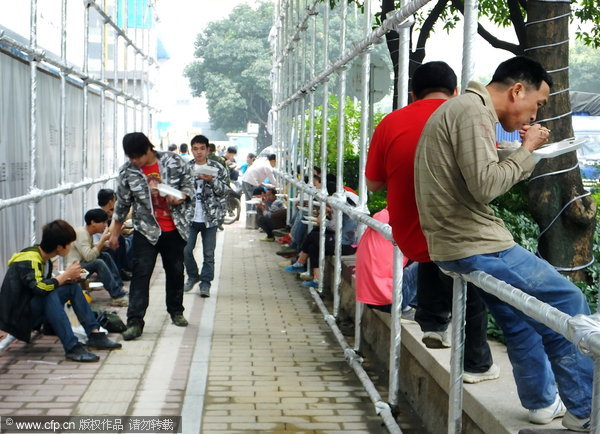Employers will have to pay
Updated: 2016-01-21 08:16
(China Daily)
|
|||||||||||
 |
|
Migrant workers are having lunch in Guangzhou, south China's Guangdong province on May 16, 2013. [Photo/CFP] |
Every year before Spring Festival there are a flood of reports of migrant workers not being paid by their employers. A range of measures recently worked out by China's Cabinet should help to at least curb the long-standing problem of employers defaulting on wages.
The measures, including real-name management of migrant workers, the overall responsibility of the chief contractor for migrant workers employed by subcontractors, the introduction of a cash deposit system and special accounts for their wages, as well as strengthened supervision, a blacklist system and strict punishments for defaulters, are expected to make it more difficult for employers to cheat migrant workers of their due pay.
The special accounts, for example, will prevent the employers from defaulting on workers' wages under the pretext of their failure to receive their own funds. While blacklisting enterprises that intentionally default on migrant workers' wages and their disclosure to the public, as well as denying them licenses, preferential loans and government procurement contracts are expected to deter enterprises from abusing the rights of migrant workers.
The strict implementation of these measures is both necessary and urgent, as the country's lingering economic woes have made life more difficult for many enterprises, small and medium-sized ones in particular, and increased the temptation for some not to pay their workers.
Although long overdue, the new measures are a concrete attempt to help migrant workers get the pay they are due and prevent unscrupulous employers from exploiting them.
The lack of a standardized labor system for migrant workers and the lack of punishments have proved to be prime reasons for wage defaults by employers. Thus, it is essential for the authorities to tackle this pressing problem by seeking to establish such a system and make employers pay a heavier price for not paying their workers.
Related Stories
Migrant worker improves lives at home 2016-01-20 08:14
Migrant worker rises to union leadership 2016-01-18 07:57
Migrant worker rises to union leadership 2016-01-18 07:57
Police stand trial over migrant worker's killing 2015-05-18 19:58
Today's Top News
China's growth envy of developed world
Foreigners find hard to but China's rail tickets
Rags to riches saga underlines China's transformation
Leaders address Iran's thirst for growth
UK's interest in China boosted by BBC TV series
Global push
AIIB chief vows to run clean, lean, green institution
'More Europe' to deal with 'triple crisis'
Hot Topics
Lunar probe , China growth forecasts, Emission rules get tougher, China seen through 'colored lens', International board,
Editor's Picks

|

|

|

|

|

|






